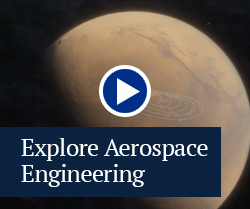Last Updated on August 28, 2023

This major emphasizes the analysis, design, and operation of aircraft and spacecraft. Students learn the theories and practices in the fundamental subjects of aeronautics, astronautics, aerodynamics and fluid dynamics, aerospace materials and structures, dynamics and automatic control, aircraft stability and control and/or orbital and attitude dynamics and control, air-breathing and rocket propulsion, aircraft systems design and /or spacecraft systems design. All of these place significant weight on the development and use of teamwork and communications skills for effective problem-solving. Graduates in aerospace engineering find employment in the customary settings such as government laboratories, large and small aerospace firms, and in nontraditional positions that also require the use of systems-engineering approaches to problem-solving; they can also pursue graduate study in aerospace engineering and related fields.
WHAT IS AEROSPACE ENGINEERING?
Aerospace engineering is the primary field of engineering concerned with the design, development, testing, and production of aircraft, spacecraft, and related systems and equipment. The field has traditionally focused on problems related to atmospheric and space flight, with two major and overlapping branches: aeronautical engineering and astronautical engineering. Aerospace engineers develop leading-edge technologies and integrate them into aerospace vehicle systems used for transportation, communications, exploration, and defense applications. This involves the design and manufacturing of aircraft, spacecraft, propulsion systems, satellites, and missiles, as well as the design and testing of aircraft and aerospace products, components, and subassemblies. Successful aerospace engineers possess in-depth skills in, and an understanding of, aerodynamics, materials and structures, propulsion, vehicle dynamics and control, and software.
YOU MIGHT LIKE THIS PROGRAM IF…
- You are interested in developing leading-edge technologies and integrating them into aerospace vehicle systems used for transportation, communications, exploration, and defense applications.
- You want to obtain a solid understanding of the foundations of aerospace systems: aerodynamics, structures, propulsion, dynamics and controls, and software, as well as unmanned air vehicles (UAVs), nano-materials, autonomous systems, and wind energy.
- You want to develop professional excellence, engineering thinking, and gain deep technical knowledge in the core disciplines and integrative systems of aerospace engineering through an innovative curriculum and world-class instruction.
- You want to make a significant global impact.
penn state aerospace engineering curriculum

The Penn State Department of Aerospace Engineering, established in 1961 and the only aerospace engineering department in Pennsylvania, is consistently recognized as one of the top aerospace engineering departments in the nation. The department is also an international leader in aerospace education, research, and engagement.
The department is built upon the fundamentals of academic integrity, innovation in research, and commitment to the advancement of industry. Through an innovative curriculum and world-class instruction that reflects current industry practice and embraces future trends, Penn State Aerospace Engineering students develop professional excellence, engineering thinking, and gain deep technical knowledge in the core disciplines and integrative systems of aerospace engineering.
Undergraduate Degree
- B.S. in Aerospace Engineering
Academic Minor
- Information Sciences and Technology for Aerospace Engineering
Undergraduate Certificate
- Space Systems Engineering
Graduate Degrees
- M.Eng. in Aerospace Engineering (One-year, non-thesis)
- M.S. in Aerospace Engineering
- Ph.D. in Aerospace Engineering
- Minor in Computational Science
- Graduate Certificate in Wind Energy
Student Organizations
- Aerospace Graduate Student Association
- American Helicopter Society
- American Institute of Aeronautics and Astronautics
- LionTech Rocket Labs
- Penn State Lunar Lion
- Sigma Gamma Tau (SGT): National Honor Society in Aerospace Engineering
- Student Space Programs Laboratory
Penn State Aerospace Engineering Requirements
Program Transfer Requirements:
Campus Options:
(Start at any campus and Finish: University Park)
Major Requirements:
No transfer admission at University Park. Applicants who have less than one year (2 or less academic semesters) of attempted college coursework may apply for admission to the College of Engineering pre-major status (ENGR) at a campus other than University Park. Direct transfer equivalency to PSU course Math 140 (4 credits of college calculus with analytic geometry) and a minimum of a 3.0 cumulative GPA is required for consideration.
General Requirements
College of Engineering:
Applicants who meet the eligibility requirements listed below may apply for admission to the College of Engineering at Penn State University Park.
All College of Engineering majors require the successful completion of a 4 credit college calculus course for transfer consideration.
Applicants who have or will have completed no more than two full time semesters may apply for admission to the College of Engineering pre-major status (ENGR) at a campus other than University Park. Students in this category typically have one year to complete entrance-to-major coursework to qualify for entrance into a College of Engineering major at University Park.
College Graduate requirements:
Applicants who hold a baccalaureate degree in any major typically will not be admitted to a baccalaureate degree program.
Related Programs
Penn State offers a variety options for students interested in Engineering and Engineering related fields.
Explore Engineering related majors
Tuition Advisory
Please be advised that a student’s tuition will increase when the Penn State transcript reflects 59.1 cumulative credits. Credits earned from tests, like AP or IB exams, are considered transfer credits and are included in the cumulative credit total. If the credits you are transferring or have transferred to Penn State place you above 59.1 cumulative credits after the start of the semester, your tuition will increase immediately. You will receive a bill for the additional tuition on the first day of the following month. For more information, visit the Office of the Bursar’s website
